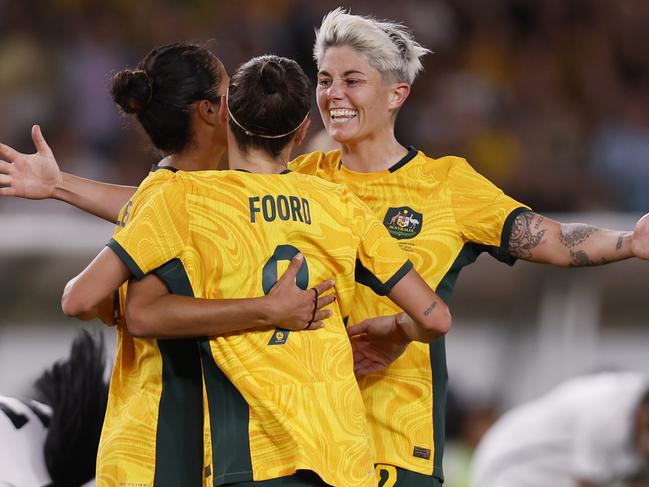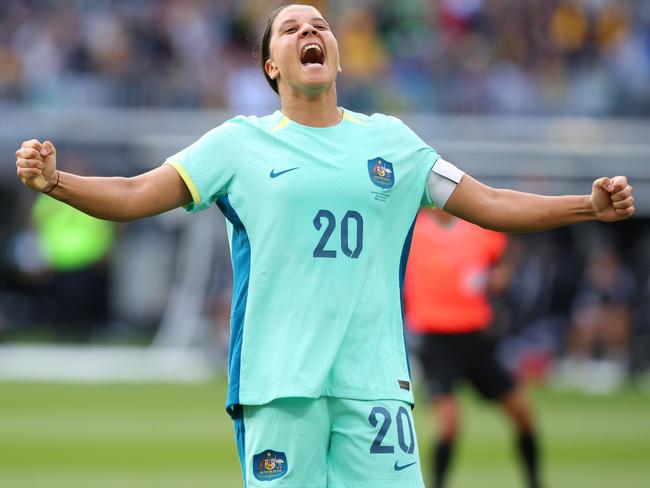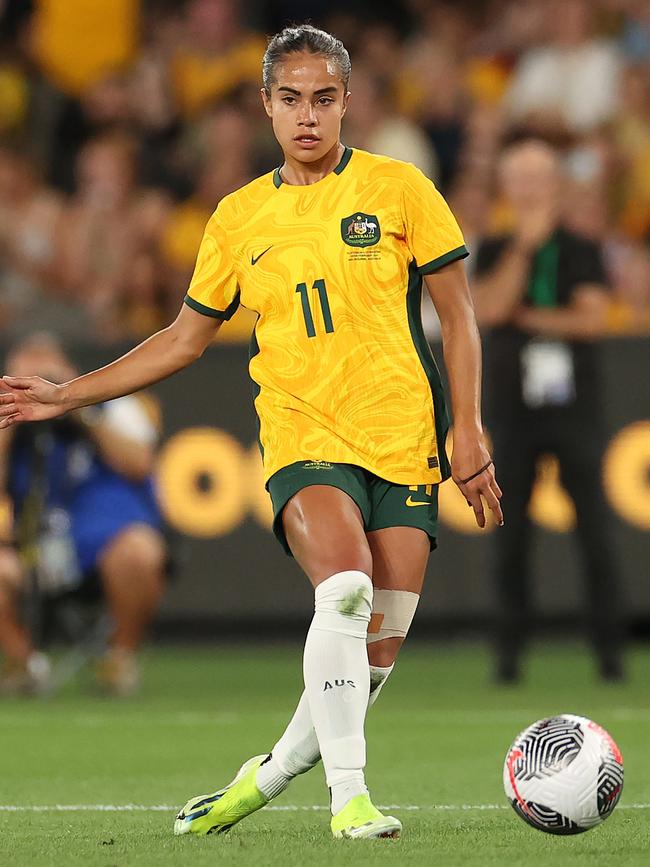How the explosion of Matildas popularity saved Football Australia, Sam Kerr furore notwithstanding
The Sam Kerr furore notwithstanding, our mighty Matildas now have claims as Australian sport’s No. 1 commodity. SHANNON GILL reveals how a smart bet by Football Australia has turned into a lifesaving jackpot.

Football
Don't miss out on the headlines from Football. Followed categories will be added to My News.
Around-the-clock reports of Sam Kerr’s UK police charge may be causing consternation for Football Australia, but they’ve also proven something.
That right now, Kerr and the Matildas are perhaps the hottest property in Australia sport.
Also, as we mark International Women’s Day, that the notion of women’s sport being gifted a commercial leg-up by male counterparts is outdated and flawed.
“Our experience is directly opposite,” Football Australia CEO James Johnson told CODE Sports this week, prior to the Kerr controversy.
A Football Australia commissioned study on brand health tracking, independently conducted by Gemba, tells the story plainly.
During January, the study found that our favourite national sporting team was indeed the Matildas, with 34 per cent of respondents ranking them as the Australian team they followed most passionately.
They were well ahead of the next best, male football counterparts the Socceroos (23 per cent) and the men’s cricket team (21 per cent).
It stands to reason that the Matildas now also have claims as Australian sport’s No. 1 commodity, offering brands access to globally-recognised players, a national team proven to stir patriotism, and a fan movement that goes way beyond the purview of established support in male-dominated sports. The Matildas, alongside the dominant Australian women’s cricket team, have shown that elite female sporting sides in Australia can unlock markets that sponsors had never dreamt of.

In 2020, the A-Leagues were carved out of Football Australia to become their own entity, or ‘unbundled’ as Johnson puts it.
The flow-on effect was that Football Australia lost the majority of its commercial revenue, money that helped fund the sport’s grassroots.
“When that happened it left a hole in our profit and loss, and our focus at the time was investing in the Matildas. The performance on the pitch but also in the brand off the pitch,” Johnson says.
Four years on, after a 2023 FIFA World Cup that transfixed a nation of sporting and non-sporting fans, sponsors are knocking on Football Australia’s door like never before. And overwhelmingly, they want to talk about the Matildas.
“The hole that the A-League left us commercially has effectively been replaced and it’s a major reason for the commercial growth of Football Australia,” Johnson says. “That’s because of the Matildas.”
Johnson believes that it’s much more than just the exposure from reaching the World Cup semi-finals on home soil. In his early days in the job in 2020, he saw a team that engaged differently than male sides traditionally did.
“I remember the first game I watched when they played China in February 2020, they stuck around for hours after the match signing autographs and giving boots, shirts and shin pads away,” he recalls.
“I thought, ‘This is a sport marketer’s dream’.
“It was more than just a match, they cared about their connection with the community. It was an opportunity that we had with this team to actually market them.”
So, will that immense goodwill neutralise any negative effect that the Kerr allegations may have on the booming Matildas brand?
Perversely, the greater the media coverage, the greater the confirmation of public interest in the Matildas and their stars, which has hit unprecedented heights. The past 12 matches the team has played in Australia have been sold out and for last week’s Olympic qualifier in Melbourne, 82 media members were accredited to cover the game; in which Kerr did not play, due to her ACL injury.

While Kerr is the team’s undisputed megastar, the rise of other heroes like Mary Fowler and Mackenzie Arnold suggests that Australia has fallen in love with the team above any one player. It remains to be seen if there will be lasting impact on the status of Kerr, who has pleaded not guilty to racially aggravated harassment.
Currently, the Matildas’ major sponsor – Commonwealth Bank – pays a reported $2 million per year to attach itself to the team. When that deal expires in 2025, experts believe the Matildas will command at least $10 million per year.
Johnson gives the Commonwealth Bank a lot of credit for buying into FA’s vision when it signed on back in 2021; though the brand power of women’s sport was well known to Comm Bank. Last decade, it changed tack on its decades-long sponsorship of Australian cricket and funnelled its backing into the women’s team, transforming how the female side of that sport was viewed commercially.
Roughly half of Football Australia’s revenue is now generated by the Matildas, which shows just how precarious the governing body’s situation was before it got serious about investing in its female stars.
Johnson confirms that the commercial rise of the Matildas has financially transformed the sport.
“If we hadn’t identified the opportunity that investing in the Matildas on and off the pitch provided, our business would be in a difficult state. That’s the reality,“ he says. “The good news is, we did.”
Originally published as How the explosion of Matildas popularity saved Football Australia, Sam Kerr furore notwithstanding




